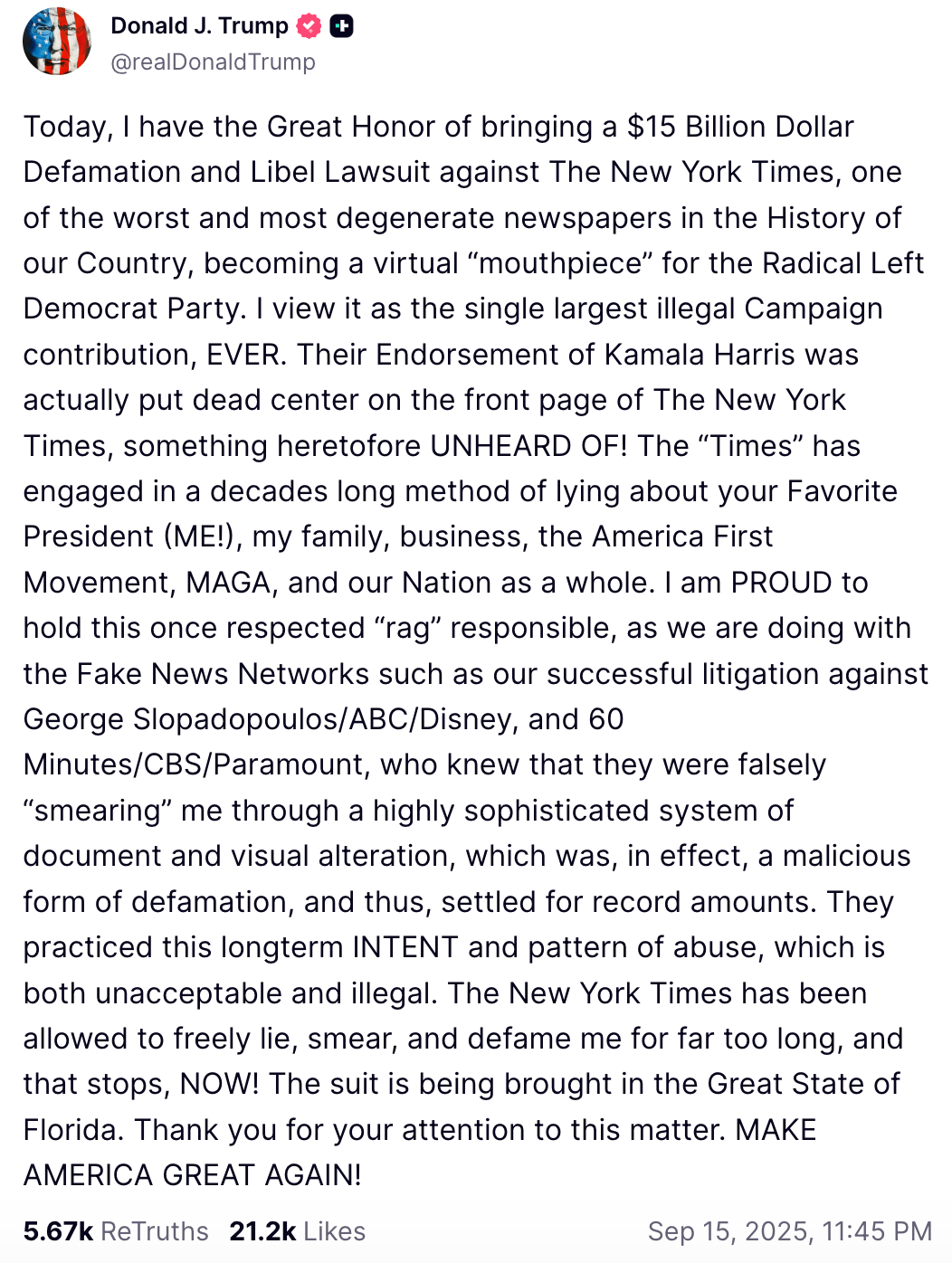Some excerpts:
The lawsuit is beyond parody, even by Trump's standards.
Yesterday, the world’s most famous mugger leapt out from the digital bushes and demanded $15 billion from The Gray Lady.
After successfully leveraging his official position to squeeze millions of dollars out of CBS and ABC, Trump has now turned his sights on the paper of record. Or, as he blustered on Truth Social, “The New York Times has been allowed to freely lie, smear, and defame me for far too long, and that stops, NOW!”

But the president files a lot of lawsuits, and most of them come to absolutely nothing.
Trump has recently sued CNN, the Washington Post, Simon and Schuster, New York Attorney General Letitia James, E. Jean Carroll, the Des Moines Register, and the Wall Street Journal. He once sued dozens of people. including Hillary Clinton, James Comey, and Trump’s own deputy attorney general Rod Rosenstein, for doing THE RICO to him. That case got him a million dollars in sanctions, with the judge calling out Trump’s “deliberate use of a frivolous lawsuit for an improper purpose” as part of a “playbook” that includes “provocative and boastful rhetoric,” “attacks on political opponents and the news media,” and “disregard for legal principles and precedent.”
But even by those debased standards, the suit against the Times is exceptionally ridiculous...
In fact, most of the supposedly defamatory allegations come from the book “Lucky Loser: How Donald Trump Squandered His Father's Fortune and Created the Illusion of Success,” written by Times reporters Russ Buettner and Susanne Craig. But while Buettner and Craig, along with their publisher Penguin Random House, are named defendants, the lawsuit functions mainly as a vehicle for Trump to vent his spleen at The Times.
Whether it’s defamatory to suggest that someone had a messy desk and battered furniture three decades ago is an open question. But Trump is a public figure, so he’ll have to prove more than that the reporting was false and damaging.
Under the landmark Supreme Court case New York Times v. Sullivan, defamation of a public figure requires “actual malice,” defined as proof that the speaker either knew that that the statement was false, or spoke with reckless disregard for the truth. Trump simply states in conclusory fashion that the authors “knew that Trump Tower in general, and in particular the office on the twenty-sixth floor, were in excellent condition and had no such defects.”
No evidence is presented to prove this supposed knowledge. And in fact, the article quotes multiple sources, including producer Bill Pruitt, who said “when you go into the office and you’re hearing ‘billionaire,’ even ‘recovering billionaire,’ you don’t expect to see chipped furniture, you don’t expect to smell carpet that needs to be refreshed in the worst, worst way.” Another producer, Alan Blum, said it was “absurd” to think that highly qualified job applicants would humiliate themselves for the opportunity to work in such a dump.
Trump insists that his name is “synonymous not only with New York City real estate but also with worldwide excellence, luxury, and opulence.” He’s clearly very sensitive about the suggestion that executive producer Mark Burnett had to “reinvent” him, burnishing his image to make him seem more successful, polished, and hardworking than he was.
“Only President Trump had the necessary combination of actual business achievement, charisma, fame, personality, intellect, and instinctual comfort in front of a television audience that could drive the show to television heights,” he protests peevishly, adding that “in truth, President Trump was the only man who could have delivered the results that Burnett and NBC sought.”

Nothing he does ever comes back to bite him, why would this?